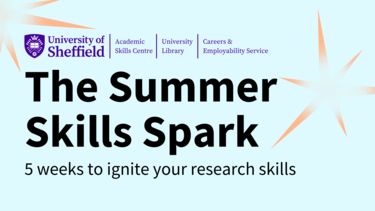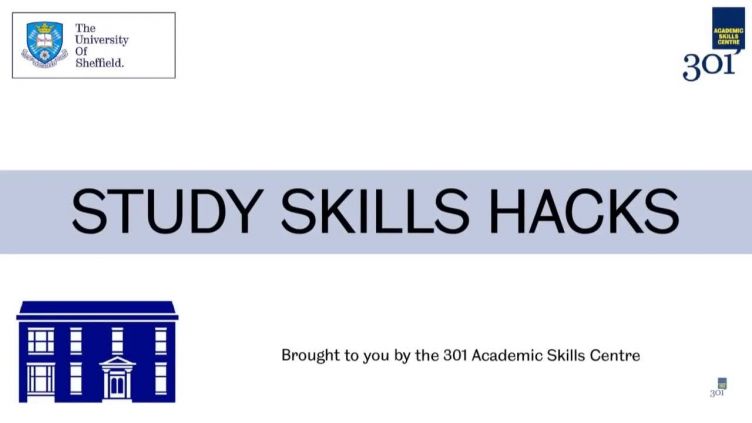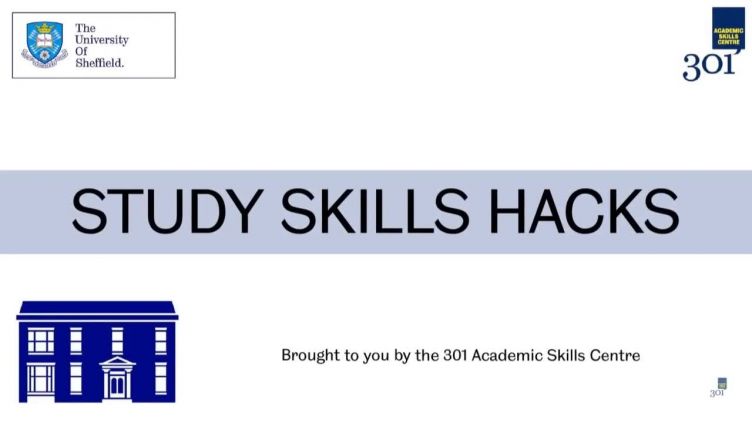Online learning
Information and guidance to help you stay on top of your workload and keep making positive progress when studying online.

Studying effectively online
Studying online can pose a number of unusual challenges. Where to work? When to work? How to maintain motivation? How to create and maintain networks of peers? How to avoid heightened feelings of isolation or anxiety?
This resource is designed to share best practice drawn from research into home working and distance learning to help you to stay on top of your workload and keep making positive progress on your university study.
This short video from the Student Communications team highlights a few of the challenges and solutions of online learning. Explore the sections below for some further ideas.
301 Recommends:
This Online Learning Essentials interactive workshop will identify the challenges and opportunities of online learning. How different is the online learning environment from what you have experienced before? How will you organise your time and stay on top of course content. This session will draw on evidence from providers of online learning such as the Open University and Futurelearn to provide advice and guidance on how to get the most out of your online learning.
Study space
Whilst it may be tempting to study from the luxury of your bed, there is strong evidence that it is a good idea to maintain a clear divide between work and leisure space.
According to Crosbie and Moore (2004), home workers emphasise that this is important in order to
- maintain a sense of being at work for your own benefit
- send a signal to those you live with
If you do not have a dedicated office space available, this may be as simple as setting up a pop-up office on your kitchen table or putting on headphones to block out distractions.
Getting dressed at the start of the day, as you would if you were going out and about, is also a good way to send a message both to yourself and those you are living with that you are at work.
Develop a routine
Just as space is important, so too is time. If you no longer need to leave your home to start work, it can be easy for the boundaries between work time and relaxation time to begin to blur – with a detrimental impact on both.
Try identifying a start time and finish time for your daily working routine and build in planned breaks through the day. When you have finished work for the day, switch off and begin to recharge your batteries with some high-quality downtime.
If you are finding it hard to stay focused while you are at work, you might want to try the Pomodoro technique to break your study time down into short, manageable chunks, with (tea and biscuit) breaks in between.
Plan and schedule
You may find that you have fewer hours of scheduled teaching sessions to provide a framework to your day, and it can be tricky to structure your independent study time.
Planning ahead is important to avoid procrastinating over what you are going to do, rather than getting on with your priority tasks.
To-do lists can be a good way to keep on top of all of the tasks that you need to work on, but remember to include some kind of ranking or way of identifying the priority tasks. For example, you could allocate a level of priority from 1–3.
That way, you won't be able to do the easier and lower priority tasks as a way to put off the more urgent and important ones.
You might want to try out a digital to-do list. Todoist or Asana are good places to start. Once you have a to-do list in place, use your Google Calendar or paper diary to plan your time as you would normally.
Try to identify exactly what you are going to do in each slot in your calendar so that you can hit the ground running.
Digital learning tools
Take time to familiarise yourself with the various digital learning tools that you will be using in semester one, some of which you may be using for the first time.
These pages include overviews and guides for the primary online learning tools you will likely encounter during your studies.
It's a great idea to familiarise yourself with these now so you know what to expect and get a head start.
One of the tools you may use extensively during semester one is Blackboard Collaborate. To help you familiarise yourself with this tool, a Blackboard Collaborate test room has been established. Use this to learn about the key functions of the platform ahead of your first sessions.
Be flexible
Although organising your study space and study time are important, don't forget to be flexible. Your time is yours to use as you see fit, which can be a tremendous advantage.
When do you tend to be most productive? Are you a morning person or an evening person? Work with your natural tendencies and be prepared to capitalise on a streak of motivation if you can.
Equally, if you are finding it difficult to focus or get on with a task, don't fight it. Take a break, go out and get some fresh air, then come back to it later on with fresh motivation.
Don't forget to include some slack and flexibility into your schedule, to recognise that things may take longer than anticipated or that you might need some contingency time built in.
Build networks
Just because you might not have as much face-to-face teaching activity, that doesn't mean you have to study alone. You are still learning as part of a cohort of peers and it is likely that you are all experiencing similar challenges.
It is also likely that your peers may have some ideas or solutions that you hadn't yet considered.
Alongside your standard course tools, such as Blackboard discussion forums and emails, you might want to start using social media tools to develop your immediate networks:
- Facebook and WhatsApp can provide great ways to build a virtual community.
- Slack and Google Chat are nice ways to organise group work remotely.
- Facetime, Google Meet or Skype can help to provide some face-to-face interaction.
See more advice on studying from home
Remember: You do not have to blur the boundary between your work and social identities in your use of social media.
Set up new groups for specific purposes where possible, and manage your account preferences to ensure that you can keep your private life private if you choose to do so.
Set goals
Setting clear and achievable goals is good practice at all times, but even more so when you do not have as regular face-to-face meetings to keep you on track.
You might want to focus on smaller-scale goals as well as larger-scale ones. For example, you could start each day by identifying the key things you would like to tick off your to-do list. See the plan and schedule section above.
Keeping your goals SMART is important so that you can make them practical and achievable, to keep making positive progress on your work. You can find out more about setting SMART goals in the short video below.
Record progress
Even if you are feeling a bit stuck, it is likely that you are still making progress, so don't despair.
Use your to-do list or priority list to track that progress by ticking tasks off or adding a column for completed tasks. This will help you recognise what you have achieved so far and maintain a sense of momentum.
If you are working on a bigger-scale task and feel that you haven't got far with it, make a note of what you have done so far so that you can pick up where you left off after a break.
You might consider using an online tool for this. Trello is a nice way to plan your tasks and keep track of what you have completed. Create cards for tasks and move them across to a completed tasks column to record your progress.
Reward yourself
Finally, reward yourself! Identify something that you can really look forward to – an evening off watching Netflix, a cup of tea and a biscuit, cake and coffee, some exercise outside or some time on social media.
Once you have finished the task you are working on, take a break and enjoy it guilt free.
You can use this on a micro-scale, ie to encourage yourself to get through the next half hour of work, or on a macro-scale, ie to take a weekend off at the end of a productive week. You have earned it.
Ask for help
Increased time spent on independent study can create an additional level of stress and uncertainty. In these circumstances, it is important to seek help as early as possible.
Your tutor is your first point of contact for academic issues relating to your course and we would recommend you keep in regular contact with your tutors. However, there are several other places that can offer support, advice and help.
Student Services Information Desk (SSID)
Student Mental Health, Counselling and Therapies Service

The Summer Skills Spark: 5 weeks to ignite your research skills
Are you working on a dissertation or research project this summer?
The Summer Skills Spark offers workshops to support you through every step of the process. You'll have opportunities to plan your projects, develop your research skills, explore dissemination techniques, and consider a future career in research.
Collaboration between 301 Academic Skills Centre, the University Library, Digital Learning, and the Careers and Employability Service.




